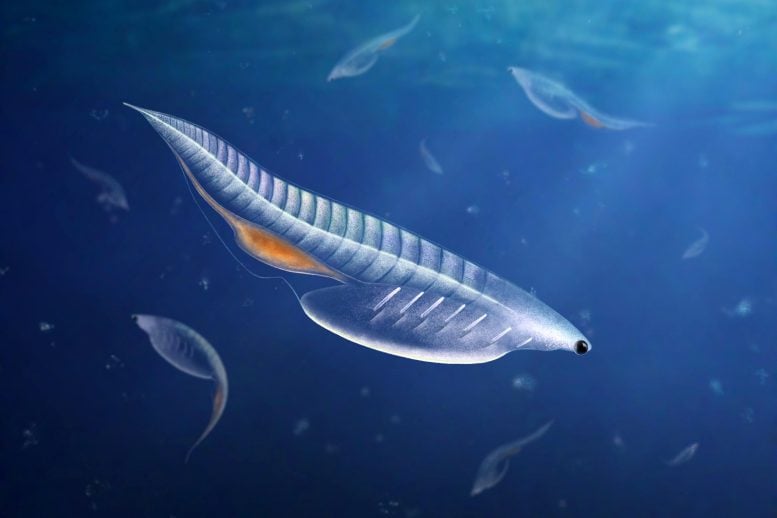
The recent uncovering of a new soft-bodied vertebrate fossil in the American Great Basin region enhances our knowledge of vertebrate evolution.
Harvard scientists discovered a new chordate species, Nuucichthys rhynchocephalus, in the American Great Basin, offering rare insights into the early evolution of vertebrates and their morphological transitions from invertebrates.
The Cambrian fossil record shows that most animal phyla had diversified and populated the Earth’s oceans around 518 million years ago. However, despite being part of this early diversification, chordates—a group that includes vertebrates like humans—are relatively rare in fossils from over 50 Cambrian sites worldwide.
In a new paper published in Royal Society Open Science, Harvard research scientist Rudy Lerosey-Aubril and associate professor Javier Ortega-Hernández present their surprising finding of a new species of chordate, and the first soft-bodied vertebrate to be discovered in the Drumian Marjum Formation of the American Great Basin.
This new fossil was part of a collection of Cambrian soft-bodied fossils deposited in the Museum of Natural History of Utah, a long-term collaborator with researchers at Harvard.

Significance of Nuucichthys rhynchocephalus
The discovery of this new species, dubbed Nuucichthys rhynchocephalus, is a valuable contribution to early vertebrate evolution and biodiversity because of the dearth of these types of organisms in Cambrian fossil sites—including South China, the Northeastern United States, and British Columbia.
Nuucichthys is also one of only four species documenting the early evolutionary stage of vertebrate lineage and, as such, is one of humanity’s oldest relatives.
In their paper, Lerosey-Aubril and Ortega-Hernández describe Nuucichthys as having a finless torpedo-shaped body that includes a number of markers characteristic of vertebrates.
“Early vertebrates start to have big eyes and a series of muscle blocks that we call myotomes, and this is something we recognize very well in our fossil,” Lerosey-Aubril said.
The new species also confirms that, despite their overall similarities to larval fish—having a cavity that is a sort of rudimentary gill system—they were devoid of fins and therefore had limited swimming capabilities.
“But all of these characteristics clearly point to some vertebrate affinities,” Lerosey-Aubril said. “And because it’s very early in the evolution of the vertebrates, they don’t have bones yet—this is why these fossils are exceedingly rare.”
Lerosey-Aubril and Ortega-Hernández speculate that Nuucichthys likely lived high up in the water column of the ocean. Because of this, and because it possessed no biomineralized parts like bones or a shell, it was particularly prone to rapid post-mortem degradation and decay, which explains why they were fossilized so rarely.
“What’s interesting with this new species is that understanding how the morphology evolved from the invertebrate type to the vertebrate type is difficult without fossils, and this new fossil tells us a little bit about that,” Ortega-Hernández said.
The Drumian Marjum site where the new fossil was found has been intensively investigated since 2022 by an international group of paleontologists led by Lerosey-Aubril and Ortega-Hernández, and both believe that continuous collecting efforts at this site may result in the discovery of new specimens of Nuucichthys rhynchocephalus in the future.
Reference: “A long-headed Cambrian soft-bodied vertebrate from the American Great Basin region” by Rudy Lerosey-Aubril and Javier Ortega-Hernández, 1 July 2024, Royal Society Open Science.
DOI: 10.1098/rsos.240350